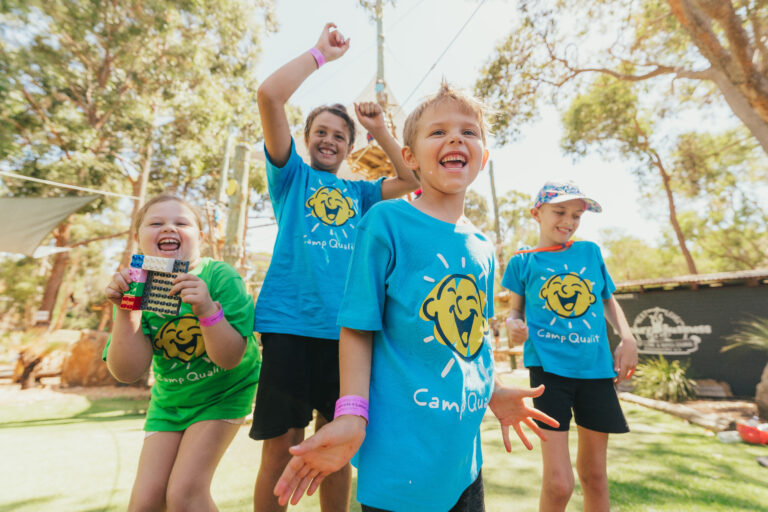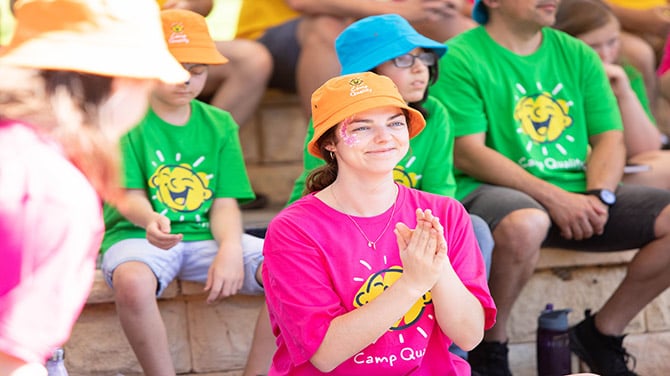Why being selfless and kind makes you happier
Giving, sharing and being selfless are backed by science as rewarding acts, which actually help with your own stress-relief and wellbeing. 5 minutes a day is all you need to get started.
Camp Quality aims to provide accurate, helpful and trustworthy information for families. Read our publishing standards.

You wouldn’t think a good laugh and a gym workout have much in common but laughing can boost our oxygen intake, improve artery function and increase the brain’s production of feel good chemicals called endorphins – just like exercise.
But to get the health benefits of laughter, including its knack of reducing stress, we have to work at fitting more laughs into our day – just as we do with exercise. Rather than wait for something to brighten our day or make us laugh, we need to seek it out, says Ros Ben-Moshe, adjunct lecturer in LaTrobe University’s school of Public Health and Psychology.
And if that doesn’t come naturally, it’s no surprise: thanks to evolution, we humans are hardwired to look for the negative.
“Being on the alert for threats and danger was a survival advantage for our ancestors – that’s why we have to work on our positive emotions, looking for more opportunities to laugh and smile, or to find and celebrate humour. It’s like any other skill – the more we do something, the better we get at it and the more it can become a habit,” she says.
A recent episode of the ABC program Catalyst, The Science of Relationships, showed how potent laughter can be for reducing stress. Neuroscientist Dr Sarah McKay measured the levels of the stress chemical cortisol produced by a group of people before and after they took part in a session of Laughter Yoga. By the end of the session, everyone’s levels of cortisol had dropped.
“One person’s cortisol levels fell by 65 per cent, while another’s dropped by 42 per cent. The higher someone’s stress level, the more impact laughter seems to have,” says Merv Neal, CEO of Laughter Yoga Australia who led the laughter session. “Laughter is a whole of body activity – not just a sound that comes out of your mouth. Besides lowering cortisol, it also raises levels of feel-good brain chemicals. It brings us back to a state of balance.”
And if you think that pretending to laugh isn’t as effective as the real thing, some research suggests that simulated laughter is more effective than spontaneous laughter.
Is laughter the best medicine? We need more studies to better understand the benefits of laughing but as research into the links between laughter and health increases, studies show how diverse these benefits seem to be. A small Israeli study of women having IVF treatment found that those who’d had a visit from a clown doctor just after having an embryo transfer were more likely to get pregnant than women who hadn’t seen a clown, while Japanese researchers found that Laughter Yoga improved blood sugar control in people with type 2 diabetes.
There’s also a growing recognition that laughter may have a place in health care, says Neal who, like Ros, was involved in an Australian study looking at Laughter Yoga as a safe form or physical activity for people undergoing dialysis for kidney disease.
“Finding laughter and positivity in daily life needs to be intentional – don’t leave it to chance,” adds Ros Ben-Moshe, whose new book The Laughter Effect, shows how to put more lightness into our daily lives and use it to manage challenging situations.
“The more you seek it, the more you see it. Every day might not be a good day but we can look for the good in every day.”
Ready to get the benefits of laughing? Ros and Merv share their tips.
Ditch the doomscrolling – try cheerscrolling instead. “It’s good to keep up with current affairs, but rather than scrolling through social media and news sites delivering a stream of bad news, search for good news stories that you find inspiring and uplifting,” suggests Ros. “Or join a comedy or humour group on social media that posts regular comedy clips or jokes.”
Give Laughter Yoga a go. It’s hard to think of anything more awkward than getting together with a bunch of strangers and pretending to laugh. But the magic of Laughter Yoga is that what starts out as forced mirth – ho, ho, ho, ha, ha, ha – soon turns into hilarious, spontaneous laughter that becomes infectious. A typical session with Merv Neal, for instance, involves a mix of clapping, laughing and gentle breathing and body movements.
“It’s a mindfulness exercise that puts you in the moment. You can do Laughter Yoga by yourself but it’s a more intense experience if you’re with other people because you bounce off each other,” he says. If you can’t find a Laughter Yoga group in your area, Laughter Yoga Australia has details of in person Laughter Yoga clubs in each state as well as online laughter yoga clubs.
Look for micro-moments that make you smile. Besides finding more reasons to laugh, it’s also good to notice and reflect on any feel good moments in your day. They might not bring a belly laugh, but they’re a way of lightening up the day, says Ros. “The more you pay attention to the small moments of goodness, the more goodness you’ll see.”
Get a regular dose of humour. Listen to funny podcasts, join a humour group on social media that posts jokes or funny cartoons daily or have a weekly comedy night – get together with family or friends to watch funny movies or sitcoms at the weekend. “Laughing together connects us with others,” she says.
Get silly with the kids. There’s so much laughter potential in spending time with kids because they’re more in touch with their silly side. They also love telling and learning silly jokes (‘why did the teacher have to wear sunglasses? Because her students were so bright’). Collect kid-friendly jokes from books or online and do some joke-swapping. Or turn the kitchen into a dance studio for a few minutes, have a disco in the lounge or dig out some board games.
“When there’s play involved, laughter isn’t far behind,” says Ros. “Play teaches both big kids and little kids that there’s another way to respond to conflict and crisis. Playing to distract or reframe helps to develop personal resilience.”
Take a Laughie. You know how to take a selfie, but how about a Laughie? Set aside time each day to take a 60 second video clip of yourself laughing – then play it back to yourself three times a day, says Merv Neal. Laughie is short for Laugh Intentionally Every Day and it may help improve wellbeing according to early UK research.
Bring humour to dinner … “When you’re sitting around the dinner table ask the family or friends if something funny happened to them today – or ask ‘what’s the funniest thing that ever happened to you?’ “says Ros.
…and keep a humour journal. “Collect and share things that make you laugh, like jokes, quotes or memes and compile them in a journal or keep them in a scrapbook – and on days when you feel flat, flick through it or search for something to add.”
Grow some gratitude. It’s not a laugh-out-loud emotion but gratitude helps create a calmer mood and may bring other benefits too. In The Laughter Effect Ros recalls a study of cardio patients who were asked to keep a gratitude journal for eight weeks, writing down two or three things they were grateful for on most days of the week. At the end of the study these patients had a better mood, better sleep and less fatigue compared to another group of cardio patients who followed their doctors’ recommendations, but without keeping a journal. Two months later, the patients were retested: those who stuck with the gratitude journal had an improved heart rhythm.
Quotes about laughter can give you a laugh (or at least a smile). Here’s some of Camp Quality’s favourites.
Research into the health benefits of laughing is promising so are we heading for a time when doctors hand out laughter prescriptions? Canada already has a program for prescribing nature, and in Australia there’s a growing interest in ‘social prescribing’ where health professionals prescribe social activities like art, gardening, sport or volunteering, says Ros – so prescriptions for Laughter Yoga or laughter therapy might not be far behind.
And what have we got to lose by laughing?
Written by Paula Goodyer, a Walkley Award winning journalist and health writer who has contributed to NSW Health and the Sydney Morning Herald.
The Laughter Effect – How to Build Joy, Resilience and Positivity in Your Life by Ros Ben-Moshe is published by Nero.
References
Laughter is the best medicine. Mayo Clinic https://connect.mayoclinic.org/blog/living-with-mild-cognitive-impairment-mci/newsfeed-post/laughter-is-the-best-medicine-1/
Beneficial effect of laughter therapy on physiological and psychological function in elders. https://www.ncbi.nlm.nih.gov/pmc/articles/PMC6279721/
Laughter-inducing therapies: Systematic review and meta-analysis. https://pubmed.ncbi.nlm.nih.gov/31029483/
The effect of medical clowning on pregnancy rates after in vitro fertilisation and embryo transfer. https://pubmed.ncbi.nlm.nih.gov/21211796/
Laughter yoga as an enjoyable therapeutic approach for glycaemic control in individuals with Type 2 diabetes: A randomised controlled trial. https://www.ncbi.nlm.nih.gov/pmc/articles/PMC10102335/
The effect of mirthful laughter on vascular function. https://pubmed.ncbi.nlm.nih.gov/20816128/#:~:text=Comedy%2Dinduced%20changes%20in%20arterial,beneficial%20impact%20on%20vascular%20function
Prescribing laughter to increase wellbeing in health adults: An exploratory mixed methods feasibility study of the Laughie. https://www.sciencedirect.com/science/article/abs/pii/S1876382018308977
Social prescribing – a highly practical way to address the social determinants of health. https://larter.com.au/social-prescribing-highly-practical-way-address-social-determinants-health/
The Laughter Prescription https://www.ncbi.nlm.nih.gov/pmc/articles/PMC6125057/

Why being selfless and kind makes you happier
Giving, sharing and being selfless are backed by science as rewarding acts, which actually help with your own stress-relief and wellbeing. 5 minutes a day is all you need to get started.

What to expect when registering with Camp Quality
Camp Quality gives kids facing cancer the chance to be kids again. By registering with us you get access to free hospital programs, online programs and more!